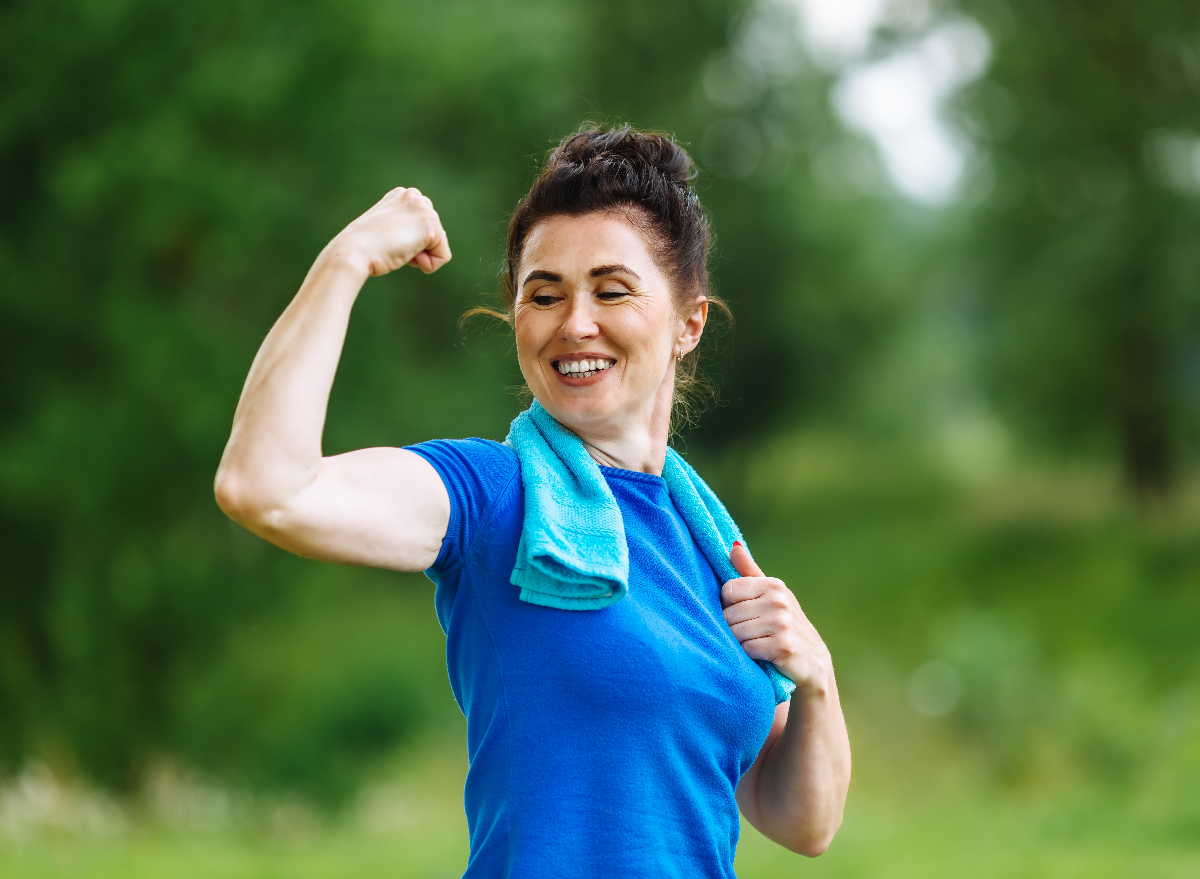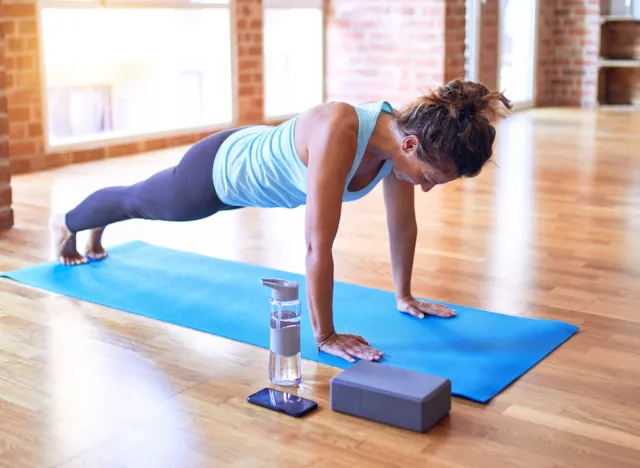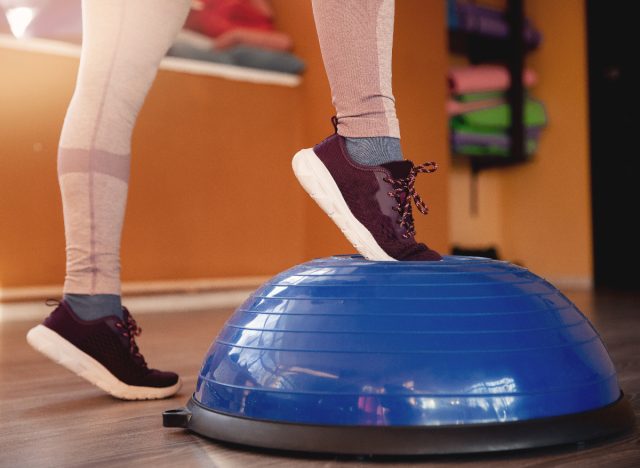5 Daily Exercise Habits for Women To Get Firm & Lean After 50

Among all the bodily changes that occur as you age, gaining weight is likely the very last thing you want to deal with. Yet when you step on the scale, those excess pounds can easily creep up, and they're difficult to lose—even when it seems like you're doing everything right. There are plenty of reasons why the scale's moving in an unfavorable direction. In your older years, you may not be as active, your metabolism isn't as fast as it used to be, and you're not limiting your calories based on how much movement you're getting, Piedmont Healthcare explains. So in order to help you get back on track—and get the scale moving in a more favorable direction—we have five daily exercise habits for women to get firm and lean after 50.
We spoke with Mary E. Holtschneider, MEd, RN and Pilates teacher at Club Pilates West Cary, Durham, and Holly Springs, NC., who raves about the benefits of engaging in a regular Pilates practice, including the fact that it can help you sculpt a lean, toned physique after turning 50. "By focusing daily on these five areas of exercises, you can enhance your movement efficiency, movement effectiveness, posture, strength, flexibility, [and] core strength," she says.
Keep reading to learn about Holtschneider's exercise habits for women to get firm and lean after 50. And next, don't miss 6 Tips for Women To Lose Belly Fat & Keep It Off.
1. Be mindful of your core.

"One of the main Pilates principles is 'centering,' meaning that all of our power is activated through the core of our body. This includes the abdomen, hips, lower back, and pelvic area," Holtschneider says. "If these areas are not as strong as they should be, we tend to compensate with less efficient movements with our arms and legs."
Some of Holtschneider's recommended core-strengthening exercises include oblique twists, hundreds, roll-ups with or without a springboard, teasers, planks, and bridging variations. If you're a newbie to practicing Pilates, it may feel a little uncomfortable working on these areas that are typically forgotten about in everyday life. "For example, lifting the head, neck, and shoulders to do hundreds can feel uncomfortable on the neck muscles, but over time as you build up your core, you will become more comfortable with this motion," Holtschneider explains.
2. Perform upper-body exercises to boost your balance.
Many individuals are sedentary for a good portion of the day. This can lead to suffering from a "tech neck" or "text neck," as Holtschneider puts it, from hunching forward when texting or typing on your laptop. "Over time these habits can lead to kyphosis, which is excessive rounding of the spine in the upper part of the back. Working the arms, chest, shoulders, and back muscles can help you support your posture and prevent problems with forward head and the undue pressure it causes on the rest of your body," she adds.
Club Pilates offers effective moves to help boost one's posture, such as standing at the springboard for chest expansions, bicep curls, tricep presses, and high rows. You'll activate your core during all of these standing springboard exercises, which makes them stellar total-body movements. You can also utilize the TRX in order to strengthen your chest, arm, shoulder, and back muscles.
3. Support and strengthen your joints through lower-body isolation.
As time goes by, your joints—especially the knees and hips—deal with chronic stress and develop imbalances that can cause pain. If you're dealing with any feet issues, that can exacerbate the situation, so it's crucial to add some footwork to your routine.
"Footwork should include stretching and strengthening the toes, the tops of the feet, arches, and ankles," Holtschneider tells us. "Legs in straps exercises have great benefits for the hips through the knees down to the feet, as these exercises help with lengthening the muscles and opening the hips. Other stretching exercises to focus on include Eve's lunge on the Reformer to open the hips, and pigeon on the chair to stretch the hips and glutes."
In addition, barre work at the springboard offers excellent lower-body strength training. You'll begin by holding onto the barre and descending into a squat, maintaining a straight back and keeping your toes pointed ahead of you. You can raise your heels a bit off the ground, and then go all the way onto your tippy toes to really work your quads and calves. Or, consider incorporating a magic circle or ball to isolate your outer and inner thigh muscles for an additional challenge. "Squeezing on the ball in between your thighs can help strengthen the inner thighs, which are stabilizers for your knees and important for overall knee health," Holtschneider adds.
4. Keep your spine fluid.
"Joseph Pilates believed that you are only as old as your spine, and spinal mobility is key to keeping you healthy. Move your spine in different directions every day to keep it flexible," Holtschneider says.
While seated in a chair, extend both arms overhead, then lower them down to your feet for spinal flexion. Still seated, bring the crown of your head toward the sky, and twist from side to side looking behind your body for spinal rotation. Next, bring each arm overhead for spinal lateral side bends. Then, sit on the ground facing away from a BOSU ball. Lie back onto the ball to flow into a deep spinal extension that opens up your chest. Lastly, while standing tall, bring both arms overhead, pull your abs inward toward your spine to create a rounded back, and then reach toward the ground.
5. Stay balanced.

Last but not least in our exercise habits for women to get firm and lean after 50 is to focus on balance. "Physiologically, we all lose the ability to balance ourselves optimally after the age of 30, so it is important to practice balance exercises to prevent falls and injuries," Holtschneider explains. "Using the BOSU at the springboard, step up and down on the BOSU with the dome side facing up to mimic balancing on an unstable surface, holding onto the barre as needed. Using the chair set at three, bring one foot onto the pedal and press up and down, adding pulses."









